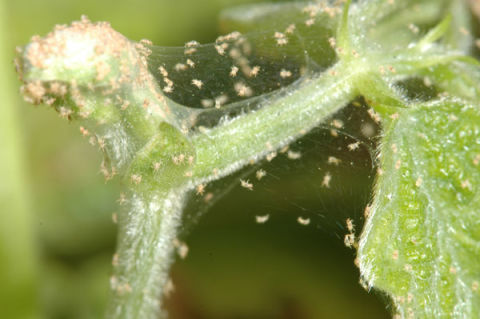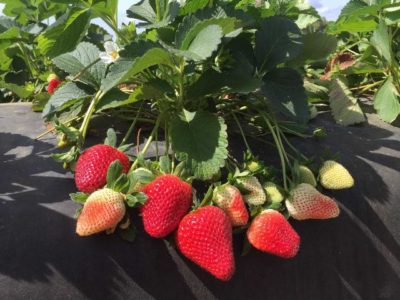IR-4 Project trial studies show cyflumetofen is an effective spider mite control on a variety of specialty crops.
Spider mites can be a major pest on specialty crops including tomatoes, cucurbits, and strawberries. They can be a particularly difficult pest to control in southern states that produce food crops year-round.

Photo courtesy of J. Noling, University of Florida.
“Mites on strawberries are especially a problem during the winter months,” said Oscar Liburd, professor and program leader of fruit and vegetable entomology at the University of Florida in Gainesville. “The weather is relatively dry and the state can experience occasional warm periods through the winter and there can be a lot of dust. These are ideal conditions for mites to develop and spread.”
Liburd said twospotted spider mite (Tetranychus urticae Koch) is a pest on cucurbit and tomato crops in Florida. This particular mite commonly feeds on a variety of vegetables including tomato, cucumbers, squash, and eggplant, as well as fruit such as strawberries, blueberries, and blackberries. More than 200 plant species can be infested by this mite.
Major spider mite outbreaks can lead to extensive webbing on the plants and large numbers of mites feeding on the leaves and stems.

Identifying effective miticides
Because spider mites have a wide host range and cause extensive damage to specialty crops, Liburd said it is important to expand the label registration of effective miticides, giving growers more tools to work with.
“My laboratory conducted efficacy studies for the IR-4 Project with the miticide cyflumetofen on summer squash and tomatoes. The trials were conducted at the university’s research station,” said Liburd.
“Although no growers participated in the efficacy trials with cucurbits and tomatoes, cyflumetofen studies were also done with blueberries and strawberries at growers’ farms. These trials were not part of an IR-4 study. Trial results with strawberries showed cyflumetofen to be an effective control. However, the data collected for cyflumetofen use on blueberries weren’t encouraging. The blueberry data was collected from only a one-year trial in 2019.”
Reducing miticide resistance
The mode of action of cyflumetofen is different than the other miticides registered for use on the specialty crops Liburd studied. Twospotted spider mite is one of about 50 species of tetranychid mites that cyflumetofen is effective against.
“Cyflumetofen can be rotated with other miticides because it has a unique mode of action which inhibits the mitochondria complex and interferes with electron transport systems in the spider mites’ cells,” said Liburd. “This is a benefit because having different modes of action decreases the potential to develop resistance. There are about seven to eight miticides registered for use on cucurbits and tomatoes.”
“Resistance to any pesticides is always possible. However, if a product is used properly, it takes a long time for resistance to develop. Rotating between different classes of pesticides, following label directions and applying the correct rates should minimize issues with resistance.”
Identifying effective cultural practices
In addition to looking at additional miticides, University of Florida researchers are evaluating strawberry varieties for resistance to mites.
Some varieties, including ‘Florida Brilliance’, ‘Florida Radiance’, ‘Sensation, Strawberry Festival’ and ‘Winterstar’, have demonstrated the potential to harbor fewer mites. These varieties were developed at the University of Florida Gulf Coast Research and Education Center in Wimauma, Fla.

“If these varieties have a higher resistance, obviously the mite pressure is going to be lower,” said Liburd. “If the plants harbor fewer mites, growers will have to spray less often. Planting these more resistant varieties in combination with applying effective miticides like cyflumetofen can definitely help to manage the mite population.”
Liburd said tomato and cucurbit growers scout regularly for spider mites, and strawberry growers use a well-developed scouting program.
“Moisture management can also be used in an IPM program to suppress mite pressure,” he said. “We did trials with irrigation methods and found mite pressure could be reduced on strawberries by providing adequate moisture using drip irrigation. We also saw a drop in mite pressure with overhead irrigation, but the problem was the disease pressure was so high that we had to abandon the crop.
“The use of overhead irrigation to help control mite populations is problematic. The overhead irrigation would have to run for a long time and the water would have to hit the leaves relatively hard in order to knock off the adult mites. The problem is overhead irrigation tends to favor plant diseases.”
Ensuring crop safety
According to University of Georgia entomologist Rajagopalbabu Srinivasan, spider mites are not as much of a problem on fall tomato crops in Georgia as they are in Florida.
“Growers usually see mites during the fall when it is dry and cool, but typically they’re not a problem,” he said. “We usually see more mite infestations when the weather is dry.
“Growers typically stop producing tomatoes before the first frost in the fall. They don’t usually start growing tomatoes again until March. Growers start producing brassicas in the fall including collards, broccoli and other crucifer crops. Mites can be an issue with these crops, but typically they’re not.”
In 2017 Srinivasan conducted a phytotoxicity trial with cyflumetofen on tomatoes.
“I have conducted other IR-4 trials, but this was the only one that was related to phytotoxicity,” he said. “We compared two rates of cyflumetofen with spiromesifen, which is a common acaricide that growers use with specialty crops.
“The tomato plants were treated when they were 10 centimeters tall and approximately 30 days old. We made one application of cyflumetofen at two rates. We waited for three weeks before looking for any phytotoxicity symptoms such as leaf burn and leaf curling. The treated plants showed no symptoms with cyflumetofen and we gave them a zero phytotoxic rating.”
For more:
Oscar Liburd, University of Florida Entomology and Nematology Department, Gainesville, FL
Rajagopalbabu Srinivasan, University of Georgia Department of Entomology, Griffin, GA
PR#: 11890 Strawberry (Mites)
PR# 11450 Tomato (Mites)
David Kuack is a freelance technical writer based in Fort Worth, Texas.
